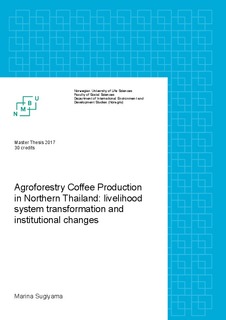| dc.contributor.advisor | Westengen, Ola | |
| dc.contributor.author | Sugiyama, Marina | |
| dc.coverage.spatial | Thailand | nb_NO |
| dc.date.accessioned | 2017-05-23T10:18:45Z | |
| dc.date.available | 2017-05-23T10:18:45Z | |
| dc.date.issued | 2017 | |
| dc.identifier.uri | http://hdl.handle.net/11250/2443264 | |
| dc.description.abstract | Coffee production in Northern Thailand is now growing. There is an interesting historical background of the hill tribe famers, opium production, slash and burn practices, as well as the state effort to empower the hill tribe farmers. Being introduced as a cash income crop, arabica coffee production by the hill tribe farmers is now increasing its significance.
This paper tries to examine the resilience of the hill tribe coffee farmers’ livelihood and analyse the transformation into coffee production with focus on institutional causes. The research applies the qualitative research approach in order to gain a thick description. The research data was collected during the field investigation in Chang Rai Province in July 2016. Semi-structured interviews and observation were conducted in five villages of Akha and Lahu tribes.
The findings showed a great diversity in how each community and each farmer has shifted to coffee farming. The study also reveals that the livelihood of the hill tribe farmers have greatly improved after having an agriculture system transformation into coffee farming. Key practices that make the livelihood resilient were agroforestry coffee farming, with application of intercropping, home gardening, and composting.
Findings from a series of interviews and observations suggest that institutional changes in the national land management has a significant impact on pushing the transformation to agroforestry coffee farming among the sample villages. However, this shift toward coffee had to be met with a demand in the domestic coffee market since the 2000s. This transformation also indicates the existence of powerful environmental discourses in Thailand behind the national land use policy which had greatly influenced farmers’ perceptions on natural resource use. | nb_NO |
| dc.language.iso | eng | nb_NO |
| dc.publisher | Norwegian University of Life Sciences, Ås | nb_NO |
| dc.rights | Attribution-NonCommercial-NoDerivatives 4.0 Internasjonal | * |
| dc.rights.uri | http://creativecommons.org/licenses/by-nc-nd/4.0/deed.no | * |
| dc.title | Agroforestry coffee production in Northern Thailand : livelihood system transformation and institutional changes | nb_NO |
| dc.type | Master thesis | nb_NO |
| dc.source.pagenumber | 72 | nb_NO |
| dc.description.localcode | M-IES | nb_NO |

